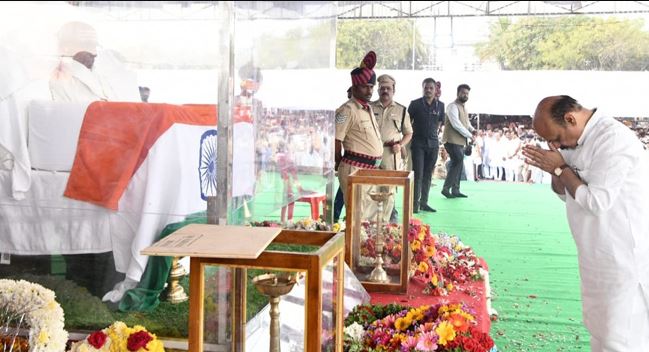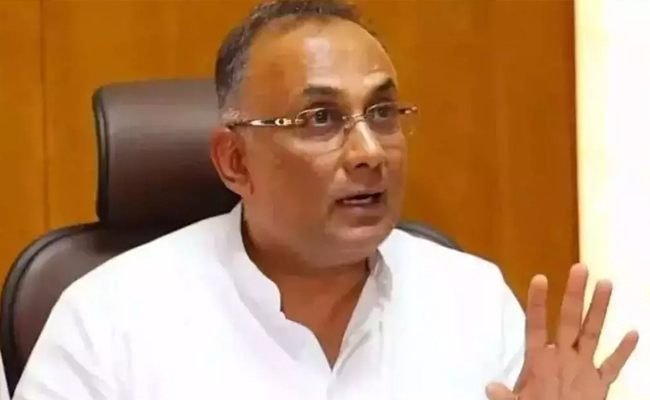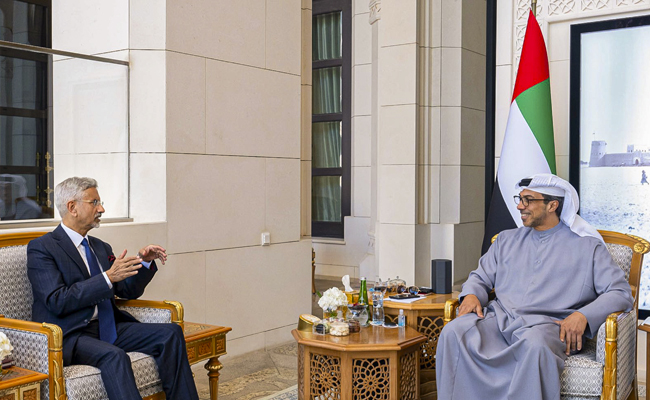Vijayapura (K'taka), Jan 2: The mortal remains of Siddeshwar Swami, the seer of the Jnanayogashrama here, who was known for his scholarly discourses and powerful oratory, was consigned to flames with full state honours on Tuesday, after lakhs of people paid last respects to the spiritual leader.
The 82-year old seer was suffering from age-related ailments for some time, and had breathed his last on Monday evening.
Lakhs of people thronged this district headquarter town from various parts of the state, some also from neighbouring states to pay their last respects to seer, whom they regarded as "Nadedaduva Devaru" (walking god).
Many even bid tearful adieu to their beloved "Siddeshwara Appavru". The seer has devotees and followers spread across Karnataka, Maharashtra and other states as well.
His final rites were performed at the Jnanayogashrama as per his wishes which he had recorded on 'Guru Purnima' day of 2014, in the form of a will titled "Antima Abhivadana Patra".
Signed by two district judges as witnesses, it said, his mortal remains are to be offered to the flames and not be buried, no religious rituals are to be conducted and his ashes are to be scattered in a river or sea, and no monument or building is to be erected in his memory.
Being soft-spoken and having a simple appearance, Swamiji was "very unassuming".
Before the last rites at the ashram, Swamiji's body draped in the tricolour was accorded full state honours by the Karnataka government and the police, at the Sainik School premises here.
Early this morning his mortal remains were brought from the ashram to the Sainik School premises, where lakhs of people, also a number of political leaders, religious leaders and prominent personalities from the literary to film field paid their respects.
The body was once again brought back to the ashram for the last rites to be performed in the evening, in a procession, with a large number of people either following it or lining up on the sides of the route with 'aartis' in their hands to say last goodbye to their "Guru", and raising slogans "Siddeshwar Maharaj ki jai."
The Vijayapura district administration and police had made elaborate arrangements for the smooth passage of all the proceedings of the day, culminating at the funeral, and for lakhs of people to pay last respects to the seer.
Living up to 'Dasoha' (commensality) tradition followed by the Siddeshwar Swami, district administration, ashram, various organisations, businesses and civilians of Vijayapura had arranged food for the seer's followers and devotees who had come from distant places, in various parts of the town.
Karnataka Chief Minister Basavaraj Bommai, Union Minister Pralhad Joshi, former Chief Minister B S Yediyurappa, Legislative Council Chairman Basavaraj Horatti, Congress Campaign Committee chief M B Patil, several of Bommai's cabinet colleagues, legislators from across parties attended the last rites at the ashram.
Several senior pontiffs or Swamijis of various prominent maths from across the state were in attendance, as the seer's mortal remains were consigned to flames, amid chanting of hymns.
Known for simple living, the seer who always was seen wearing white jubba with no pockets and dhoti, stayed away from awards and felicitations. According to ashram sources, he had even refused Padma awards.
He never discriminated between any religion, caste or gender, and had no political strings attached to him, they added.
Let the Truth be known. If you read VB and like VB, please be a VB Supporter and Help us deliver the Truth to one and all.
New Delhi: A bill to set up a 13-member body to regulate institutions of higher education was introduced in the Lok Sabha on Monday.
Union Education Minister Dharmendra Pradhan introduced the Viksit Bharat Shiksha Adhishthan Bill, which seeks to establish an overarching higher education commission along with three councils for regulation, accreditation, and ensuring academic standards for universities and higher education institutions in India.
Meanwhile, the move drew strong opposition, with members warning that it could weaken institutional autonomy and result in excessive centralisation of higher education in India.
The Viksit Bharat Shiksha Adhishthan Bill, 2025, earlier known as the Higher Education Council of India (HECI) Bill, has been introduced in line with the National Education Policy (NEP) 2020.
The proposed legislation seeks to merge three existing regulatory bodies, the University Grants Commission (UGC), the All India Council for Technical Education (AICTE), and the National Council for Teacher Education (NCTE), into a single unified body called the Viksit Bharat Shiksha Adhishthan.
At present, the UGC regulates non-technical higher education institutions, the AICTE oversees technical education, and the NCTE governs teacher education in India.
Under the proposed framework, the new commission will function through three separate councils responsible for regulation, accreditation, and the maintenance of academic standards across universities and higher education institutions in the country.
According to the Bill, the present challenges faced by higher educational institutions due to the multiplicity of regulators having non-harmonised regulatory approval protocols will be done away with.
The higher education commission, which will be headed by a chairperson appointed by the President of India, will cover all central universities and colleges under it, institutes of national importance functioning under the administrative purview of the Ministry of Education, including IITs, NITs, IISc, IISERs, IIMs, and IIITs.
At present, IITs and IIMs are not regulated by the University Grants Commission (UGC).
Government to refer bill to JPC; Oppn slams it
The government has expressed its willingness to refer it to a joint committee after several members of the Lok Sabha expressed strong opposition to the Bill, stating that they were not given time to study its provisions.
Responding to the opposition, Parliamentary Affairs Minister Kiren Rijiju said the government intends to refer the Bill to a Joint Parliamentary Committee (JPC) for detailed examination.
Congress Lok Sabha MP Manish Tewari warned that the Bill could result in “excessive centralisation” of higher education. He argued that the proposed law violates the constitutional division of legislative powers between the Union and the states.
According to him, the Bill goes beyond setting academic standards and intrudes into areas such as administration, affiliation, and the establishment and closure of university campuses. These matters, he said, fall under Entry 25 of the Concurrent List and Entry 32 of the State List, which cover the incorporation and regulation of state universities.
Tewari further stated that the Bill suffers from “excessive delegation of legislative power” to the proposed commission. He pointed out that crucial aspects such as accreditation frameworks, degree-granting powers, penalties, institutional autonomy, and even the supersession of institutions are left to be decided through rules, regulations, and executive directions. He argued that this amounts to a violation of established constitutional principles governing delegated legislation.
Under the Bill, the regulatory council will have the power to impose heavy penalties on higher education institutions for violating provisions of the Act or related rules. Penalties range from ₹10 lakh to ₹75 lakh for repeated violations, while establishing an institution without approval from the commission or the state government could attract a fine of up to ₹2 crore.
Concerns were also raised by members from southern states over the Hindi nomenclature of the Bill. N.K. Premachandran, an MP from the Revolutionary Socialist Party representing Kollam in Kerala, said even the name of the Bill was difficult to pronounce.
He pointed out that under Article 348 of the Constitution, the text of any Bill introduced in Parliament must be in English unless Parliament decides otherwise.
DMK MP T.M. Selvaganapathy also criticised the government for naming laws and schemes only in Hindi. He said the Constitution clearly mandates that the nomenclature of a Bill should be in English so that citizens across the country can understand its intent.
Congress MP S. Jothimani from Tamil Nadu’s Karur constituency described the Bill as another attempt to impose Hindi and termed it “an attack on federalism.”



_vb_22.jpeg)

